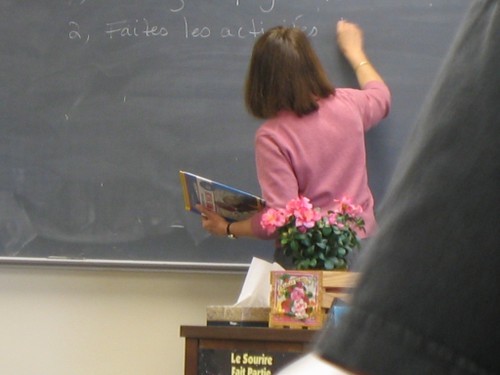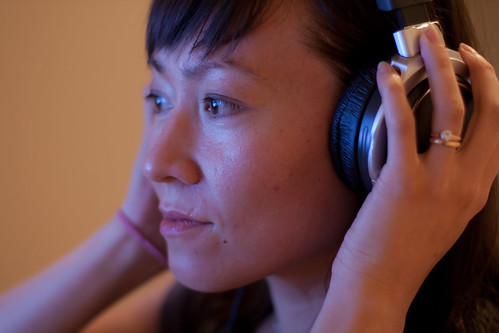Review: French Today Products
Excited by Camille Chevalier-Karfis’ guest post on improving listening and speaking abilities after structured classes (including those at school or university), we are reviewing some of her learning tools. Here we discuss ‘A Moi Paris‘ and ‘Secrets of pronunciation‘. These materials are from FrenchToday.com, a website that useful for French learners of any level.
 ‘A Moi Paris’
‘A Moi Paris’
Level: Beginner to Intermediate
Aim: Introduction to modern French pronunciation; improved understanding of common vocabulary and verbs in the present tense; improved confidence.
Synopsis: This audio novel follows the daily activities of a group of three students and their friends in Paris; from the taking the train, going to classes or the cinema, holding a party, moving houses and dealing with illnesses and disputes.
The package includes:
- The French novel (French text with matching audio) which is broken into 16 chapters that total over 80 minutes of audio recordings.
- The workbook with extra vocabulary and verb conjugations (French text with matching audio and English translations)
- The Questions & Answers Exercise Book (French text with matching audio and English translations)
- The translations of the novel in 7 languages
Note: The story part of this audiobook is available on frenchtoday.com for free. The translations and companion workbooks are part of the paid product.
Listening Station: The Record from abbyladybug on flickrReview: I studied French at high school and university, but I have not continued to practise it regularly, so my abilities have declined. This is particularly the case in my aural comprehension and speaking. I found this learning package useful. I could understand most of what was said because:
- the recordings are high quality;
- the dialogues are well-paced (the first chapter was a bit too slow, but after that I think that Camille has found a good speed);
- the situations are common;
- the recordings use simple vocabularly and grammatical structures (e.g.: It mostly uses present tense and a lot of ‘est-ce que’ construction over inversion);
- there is a subtle progression throughout the 16 chapters, including the introduction of reflexive verbs and more colloquialisms, and increased speed.
If I didn’t know the meaning of any words, I could look it up in the transcripts or translations.
Because the situations are light and familiar (there is a lot of introductions and polite chit chat), I think this package covers useful vocabulary for different level French learners. Beginners, for example, could learn common phrases even without much grammar knowledge.
Because this is such a comprehensive package, people can use it in different ways; they can just listen to the story and feel good they are able to understand it (I thought to myself, “All those years of learning French have not been lost!”); learn some vocabulary or work through all the exercises I the workbook and Q&As.
‘A Moi Paris’ caters, in my opinion, to Anglophones learning French, because it uses some words in French that are easy for us to understand, but that might not be the prefered word for les vrais français, including “camarades de chamber” for ‘roommates’, whereas my Parisian friend says she and her friends usually say “colocataires” and they wouldn’t say “O-la-la”.
 ‘Secrets of French Pronunciation’
‘Secrets of French Pronunciation’
Level: All Levels
Aim: To improve pronunciation
Synopsis: This 1 hour and 42 minutes audio lesson covers the foundations as well as the difficulties of French pronunciation. It includes directions on how to place your lips, tongue and throat; clear examples in English where the sounds appear, as well as in French words.
The package includes:
- The audio lesson
- A transcription
Review: I learnt French pronunciation at school and at university (where we studied phonetics for a semester), but I found Camille’s explanations of the basic rules mouth, lips and tongue placement more useful than all of my other learnings. I think most people could understand and emulate Camille’s explanations. I found it to be a great refresher.
Camille clearly and concisely introduces us to French rhythm, tonic accent, voice pitch, vowels; consonants, silent letters, liaisons and elisions (i.e.: when you drop the final ‘e’ of a few short words when the next word begins with a vowel sound, to avoid a clash of vowels).
‘Secrets of French Pronunciation’ also covers the difficult French ‘Y’ sound (-ille, -eille, -aille, – euille and -ouille) and the two French Hs (mute or aspirated).
Here is an example that demonstrates the clarity of her explanations:
A like the a of ‘father’.
(beware, never like fate or hate).
The mouth and lips are open VERY wide. The chin drops. It’s a pretty long sound compare to the English a. A is the strongest, loudest French vowel.
ex: papa, sa, mâle…









